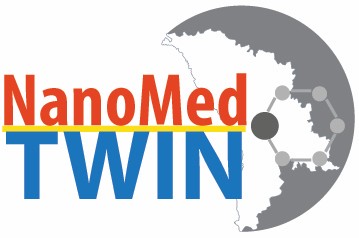|
The main objective of the NanoMedTwin project is to promote the Smart Specialization Strategy in Moldova through developing the field of nanomaterials for biomedical applications by enhancing the scientific excellence of the National Center for Materials Study and Testing (NCMST) of the Technical University of Moldova via a collaborative strategic partnership program with European leading centres.
This will be achieved through:
• Promoting links between the NANO and BioMedicine fields. (WP2)
• Training of a new generation of highly-skilled researchers capable of developing these fields and creating a leading national infrastructure at NCMST. (WP3)
• Developing a strategic research program focusing on nanomaterials for biomedical applications at NCMST including aspects related to technology transfer. (WP4)
• Extending collaborative networking and creation of capacities for broader participation of NCMST in Horizon-2020 and FP9 Programs. (WP5, WP6)
The promotion of links between the fields of nanomaterials and biomedicine will be performed through an intense exchange of knowledge and experience with partners on both bilateral and multilateral levels, accomplished by expert staff and student visits.
The training of a new generation of researchers will be performed through establishment of a nano-biomedicine training program to integrate the principles of nanotechnology, nanomaterials and biomedicine in research and coursework, and will be implemented by actions such as: (i) Moldavian students attending specific modules of Master programs at the partner institutions; (ii) two summer schools; (iii) theoretical and practical courses at NCMST for Ph.D. students and young researchers.
The project will also target the development of skills for management of innovation activities from the laboratory discovery phase to the point of technology transfer to medical institutions. This will be accomplished by means of transfer of practices and policies from the partner institutions to NCMST.
|
Project activities will include:
- Promotion of the link between NANO and BioMedicine fields (Objective 1). The current research efforts of NCMST in nanotechnology and electronic engineering for biomedicine will be consolidated and further developed to target nanobiomedicine applications. Nanotechnology brings together a whole array of different disciplines together such as physics, material sciences, electronics, photonics, information technologies, and biotechnologies, with a potential to achieve a tremendous improvement in human abilities, the nation’s productivity, and the quality of life.
- Training of a new generation of highly-skilled researchers capable of developing novel nanomaterials for biomedical applications and creating a leading national infrastructure in these fields at NCMST (Objective 2). Progress in this field depends on a multidisciplinary approach and assembly of a critical mass in the research effort by bringing together biologists, chemists, physicists, medical doctors and engineers. Convergence of previously separate scientific disciplines and fields of engineering cannot take place without the emergence of a new generation of experts who understand multiple fields in depth and can intelligently work to integrate them.
- Developing a strategic programme focusing on the field of nanomaterials for biomedical applications, establishing links with medical institutions in Moldova and building of capacities for promotion of technology transfer in the field of nanomaterials for biomedical applications (Objective 3). In order to increase the wealth of the Moldovan economy over the long term, the main emphasis needs to be on high-tech products with a high added value, since Moldova has no raw materials or traditional fossil sources of energy. The promotion of technology transfer will be implemented in the project through the transfer of knowledge and expertise in this field from leading centres in the EU to the staff of the NCMST, especially to young researchers.
- Extending networking and collaboration and creation of capacities for broader participation of NCMST and other linked research groups in Moldova in the Horizon 2020 Programme and future FP9 Programme (Objective 4). This will result in the creation of research and innovation project consortia through the collaboration of NCMST with other research groups in Europe working in the field of nanobiology and nanomedicine and preparing project applications in Horizon 2020 and the future FP9 Programme.
|
